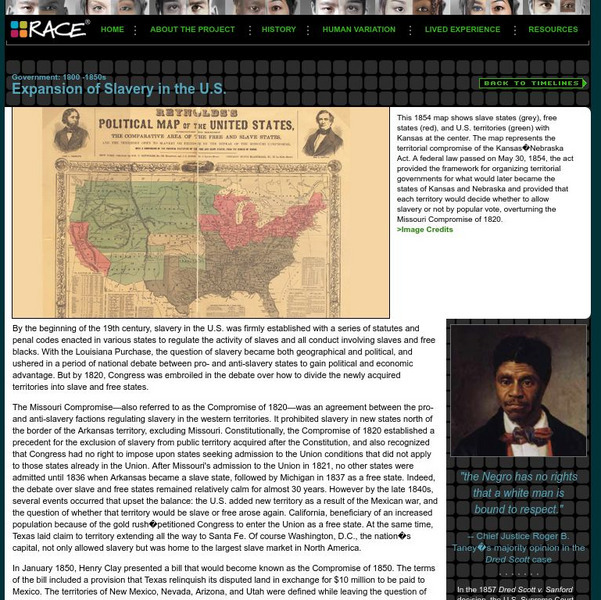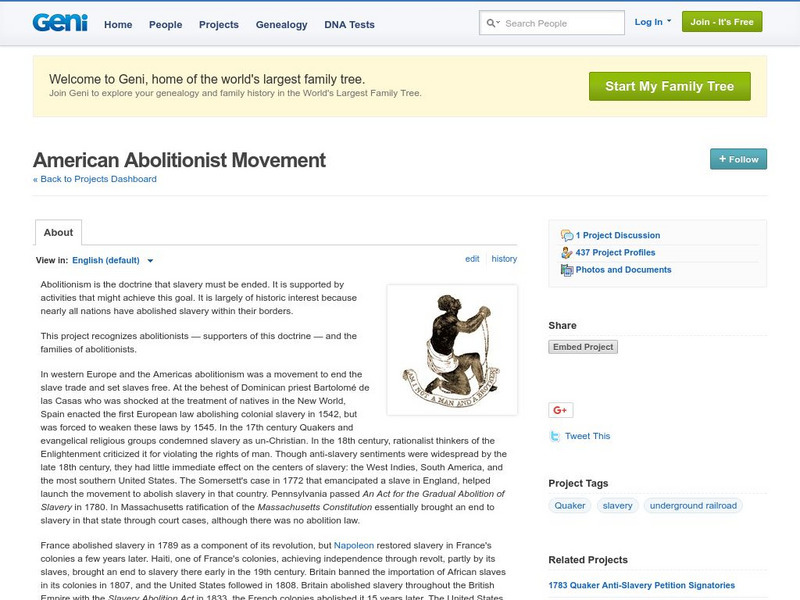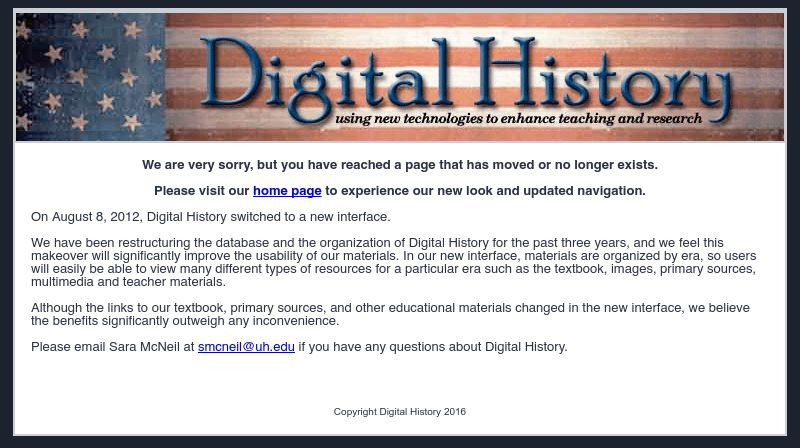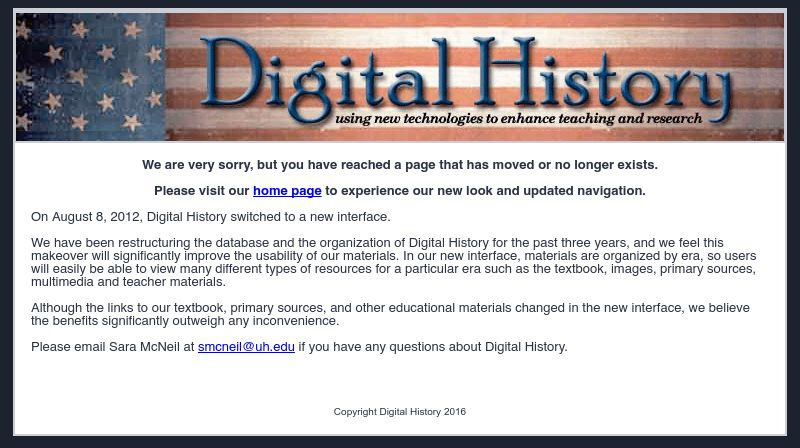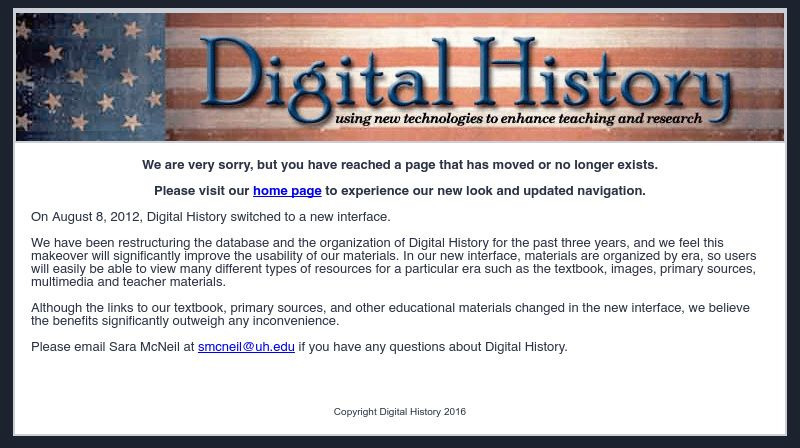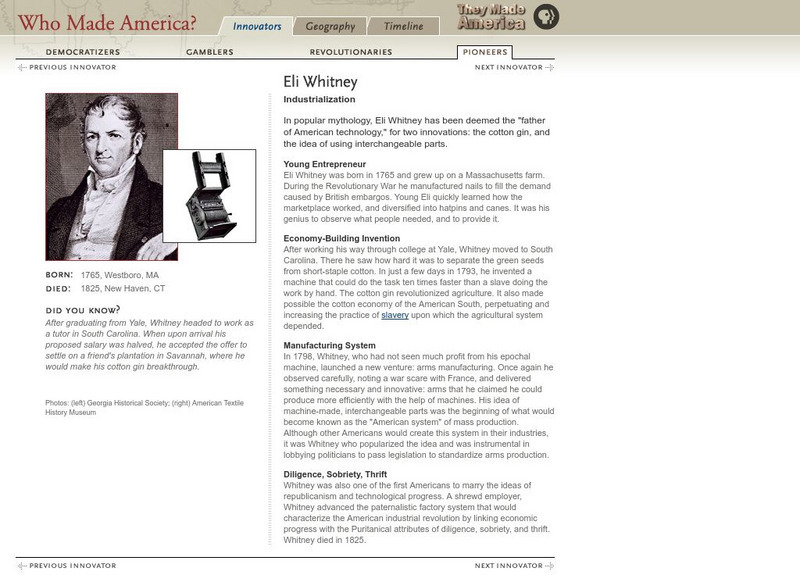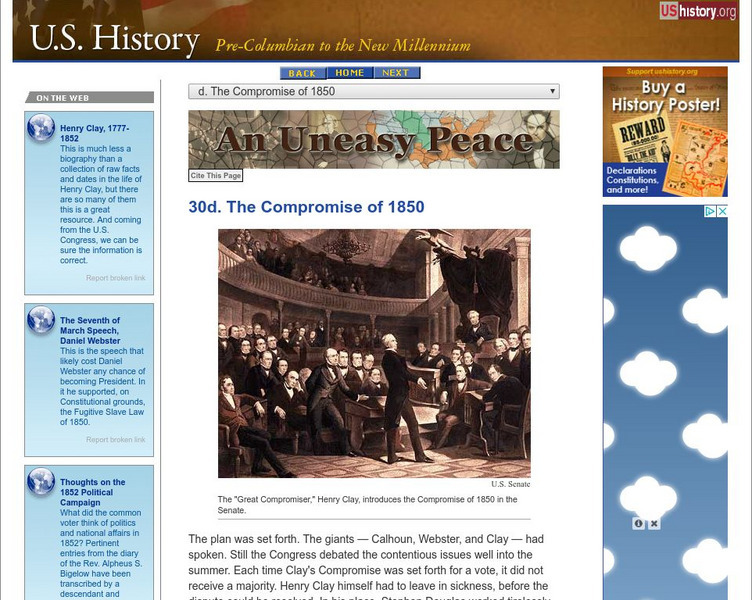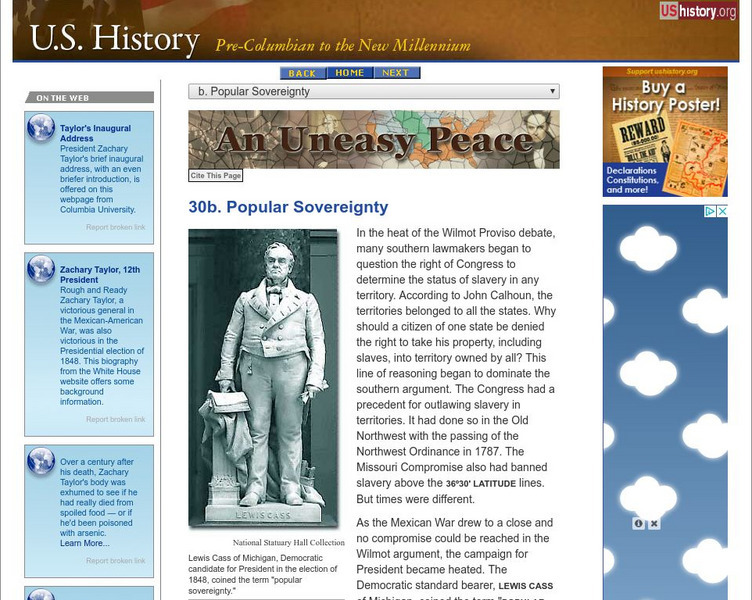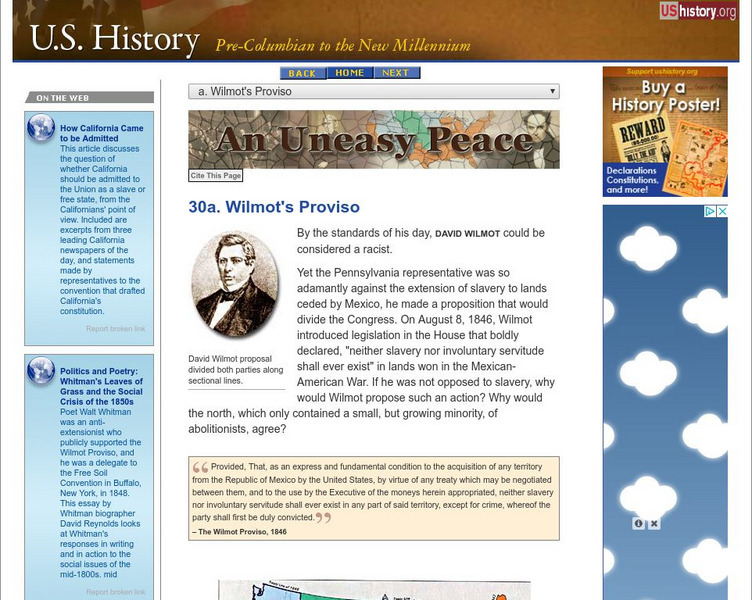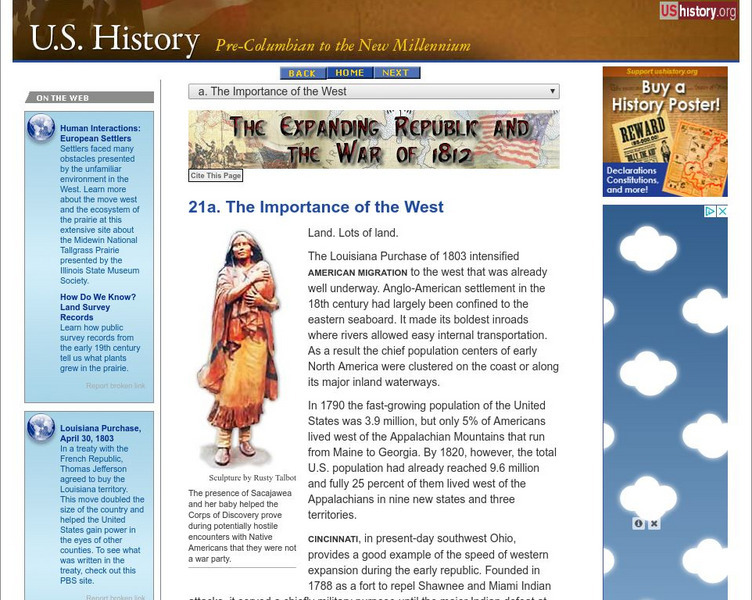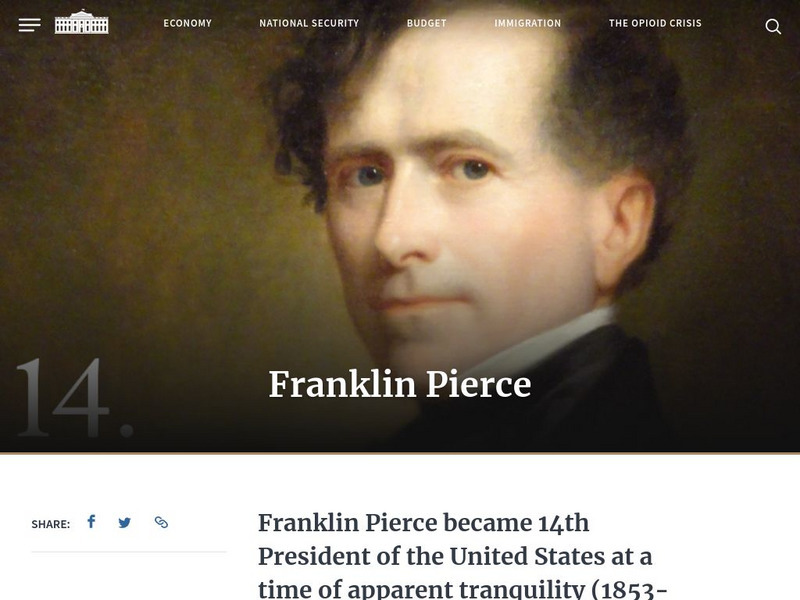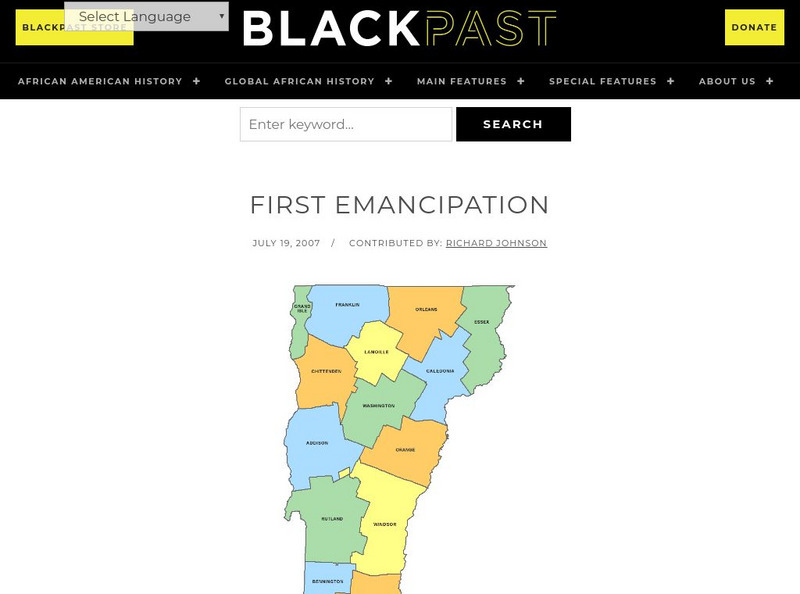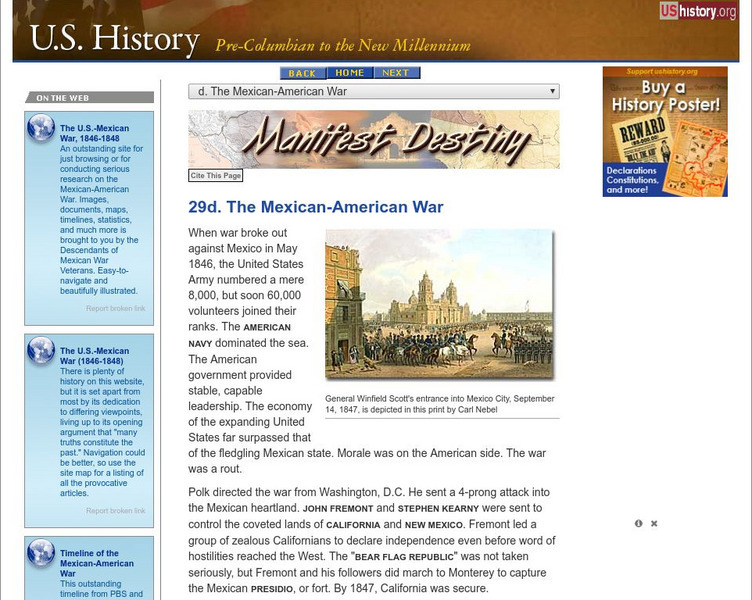Hi, what do you want to do?
Library of Congress
Loc: National Expansion and Reform 1815 1880
Follow the territorial and westward expansion of the newly formed United States. Learn about the thriving slave trade of that era and the spread of reform efforts across the country.
Other
American Anthropological Association: 1800 1850s: Expansion of Slavery in the Us
Outlines the political events prior to the Civil War as the United States expanded its territories to include new states and conflicts arose over the issue of slavery.
Other
Geni: American Abolitionist Movement
Looks at the history of the abolitionist movement in the United States, the key people involved, and important events.
US Department of State
Bureau of International Information Programs: History Outline: Sectionalism
Article reviews several conditions of American society that sowed the seeds of civil war, particularly slavery and sectional conflict.
National Humanities Center
National Humanities Center: Toolbox Library: William Seward, Triumph of Nationalism: America, 1815 1850
The National Humanities Center present a reading guide that links to a speech in the Senate by William Seward, one that expresses moral outrage over the compromises allowing the expansion of slavery.
University of Groningen
American History: Outlines: A Divided Nation
This page from the American Revolution Project of the University of Groningen discusses how the 1850s were a time of conflicting ideas between North and South regarding the expansion of slavery. Scroll down to the third paragraph and...
Library of Congress
Loc: Slavery in the United States: Primary Sources
This lesson introduces students to primary sources- what they are, their great variety, and how they can be analyzed. The lesson begins with an activity that helps students understand the historical record. Students then learn techniques...
Digital History
Digital History: The Mexican War
Read about the attempt by the United States to purchase land in the Southwest prior to the declaration of war between the two countries. Find out the causes of the war, and see that there was considerable opposition to the war in the...
Digital History
Digital History: Slavery in a Capitalist World
Read about the discontinued use of slave labor in the Western world in the first half of the 19th century in all but five countries in the Western Hemisphere, most notably, the American South. See why Southern politicians and slave...
Digital History
Digital History: The Compromise of 1850
Before finding the final terms of the Compromise of 1850, read about the disputes and debate that accompanied the attempts to pass something that would address Northern and Southern concerns.
Digital History
Digital History: The Kansas Nebraska Act
An explanation of how the Kansa-Nebraska Act in effect voided the Missouri Compromise, which had been the law that dictated the territories that could allow slavery. Read about the act proposed by Stephen A. Douglas, and see how a...
PBS
Pbs Who Made America? Eli Whitney
In popular mythology, Eli Whitney has been deemed the "father of American technology," for two innovations: the cotton gin, and the idea of using interchangeable parts.
Other
Fca Homeschool: History 806
A sample lesson plan covering the sectionalism and problems facing the nation in its debate on slavery in the 1850s.
Independence Hall Association
U.s. History: The Compromise of 1850
Find the various parts of the Compromise of 1850, proposed by Henry Clay, that extended slavery in some cases, prohibited in others, and added California as a free state. A clear chart shows what parts of the law were beneficial to the...
Independence Hall Association
U.s. History: Popular Sovereignty
Read about the concept of popular sovereignty in relation to issue of expansion of slavery in the territories. It was not as simple as it seemed. Find out about how the issue of slavery was addressed in the election of 1848. Included is...
Independence Hall Association
U.s. History: Wilmot's Proviso
Congressman David Wilmot, even before the end of the Mexican-War, proposed legislation that would outlaw the expansion of slavery into the new territory, should the United States acquire it. Read about his reasons for proposing the...
Independence Hall Association
U.s. History: The Importance of the West
Westward migration, west of the Appalachians, resulted in a rapid population growth. Read about where the population exploded, and why the inland rivers were so important to the growth.
Constitutional Rights Foundation
Constitutional Rights Foundation: Moving Toward Equality Under Law
As new free and slave states were admitted to the Union prior to the Civil War, political divisions kept growing, despite attempts to balance the numbers of each. The South pushed for slavery to expand westward, while anti-slavery...
Ohio History Central
Ohio History Central: Free Soil Party
A description of the platform and beliefs of the Free Soil Party which opposed expansion of slavery into US territories.
University of Virginia
Miller Center at Uva: u.s. Presidents: James Knox Polk: Domestic Affairs
Read about the domestic policies of the Polk Administration.
The White House
The White House: Presidents: Franklin Pierce
Details Franklin Pierce's career as the 14th President of the United States and his background information. A portrait is included.
Other
Course Notes: Us History: 1840 1877: Expansion and Slavery
A list with short descriptions of the issues and events that impacted the expansion of the frontier, with slavery being the most significant issue.
Black Past
Black Past: The First Emancipation
This encyclopedia entry gives interesting information about how the Quakers encouraged legislation that led to the banning of slavery in states in the Northeast by 1820.
Independence Hall Association
U.s. History: The Mexican American War
The Mexican-American War fulfilled James Polk's desire to acquire the territory of New Mexico and California from Mexico. See how the fight was provoked, and read about Stephen Kearny's actions in New Mexico and John Fremont's in...






